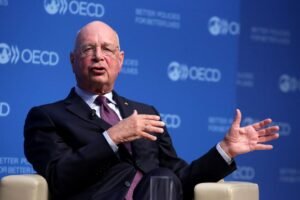The World Economic Forum’s annual meeting in Davos is being held from January 15-19, 2024. This year, the focus has been on establishing a global collaboration in order to address key challenges such as geopolitical tensions and the potential of artificial intelligence along with enhancing the global economic growth.

The event began with a call for global cooperation by Professor Klaus Schwab who is the founder and executive chairman of the World Economic Forum. He spoke about the need for positive impact in the face of the diverse and very serious global challenges currently plaguing the world.
Cooperation and collaboration have been the highlights this year given the multitude of issues that the world is experiencing, especially with the heightened political and geopolitical uncertainties and the unpredictability of climate change and AI.

Davos 2024: Calls for global collaboration
Leaders like Ursula von der Leyen who is the President of the European Commission, and Jake Sullivan, United States National Security Advisor at Davos highlighted the importance of driving global collaboration amidst geopolitical complexities. The Global Cooperation Barometer 2024 emphasized the coexistence of global cooperation and competition which is aimed at building resilience and security in the face of challenges. The last couple of years have been afflicted with uncertainty and coupled with turmoil, such times call for collaborative efforts on part of nations.
Geopolitical uncertainties
Geopolitical tensions were an important part of the discussions. There were calls made for global unity and cooperation. Sheikh Mohammed bin Abdulrahman Al-Thani, Prime Minister and Minister of Foreign Affairs of Qatar, urged parties to come together in response to the conflict in Gaza. Ukrainian President Volodymyr Zelenskyy announced plans for a global summit to promote peace and called for continued global support against Russian aggression.
Economic outlook discussions at Davos 2024 highlighted the uncertain global economic landscape. Chinese Premier Li Qiang stressed the need for global conversation and collaboration in economic governance and the multilateral trading system. Leaders such as Vietnam’s Prime Minister Pham Minh Chinh highlighted the importance of economic growth without compromising social equity or environmental protection including gender parity.

Monetary Policy and Economic Governance
Monetary policy discussion at Davos addressed the potential drop in interest rates in some economies, with François Villeroy de Galhau, Governor of the Central Bank of France. There were suggestions for an era of fair money rather than easy or free money. The challenge of balancing growth with responsible economic policies was a key theme.
AI development risks and regulation
The impact of AI was a significant focus at Davos with discussions on reskilling and responsible use. Chinese Premier Li Qiang called for improved global AI governance mechanisms and shed light on the need for a balance between innovation and regulation. The potential of AI to address complex problems was acknowledged, with leaders like Satya Nadella, CEO of Microsoft, highlighting diverse applications. Cybersecurity concerns in the age of AI were emphasized by Ruth Porat, CFO at Google.
Energy Transformation: Building Future Systems
Energy system transformations were discussed, acknowledging significant shocks to energy supplies in recent years. Ursula von der Leyen highlighted collaborative efforts between businesses and nations to build future energy systems. Li Qiang highlighted China’s progress in developing energy systems, including photovoltaic capacity and transportation. The importance of an unbiased and sustainable energy transition was an important part of the sessions discussing energy efficiency. The role of the private sector in combating climate change was also suggested.
Overall, Davos 2024 provided a platform for leaders to address global challenges, call for collaboration, and discuss solutions for geopolitical tensions, economic uncertainties, AI’s impact, and energy transformations. The core emphasis was on global unity and responsible decision-making. It underscored the need to address these complex issues for the benefit of the world. It is, however, yet to be seen whether this forum will bring about any real change. COP 28 also discussed several pertinent issues yet implementation of the solutions has not been as seamless as expected.











Comments 2